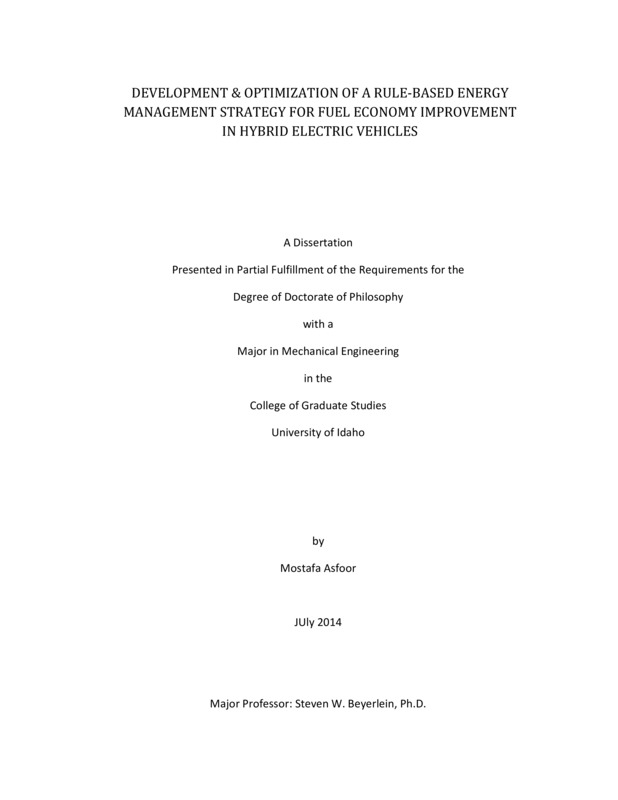DEVELOPMENT & OPTIMIZATION OF A RULE-BASED ENERGY MANAGEMENT STRATEGY FOR FUEL ECONOMY IMPROVEMENT IN HYBRID ELECTRIC VEHICLES
Asfoor, Mostafa. (2014). DEVELOPMENT & OPTIMIZATION OF A RULE-BASED ENERGY MANAGEMENT STRATEGY FOR FUEL ECONOMY IMPROVEMENT IN HYBRID ELECTRIC VEHICLES. Theses and Dissertations Collection, University of Idaho Library Digital Collections. https://www.lib.uidaho.edu/digital/etd/items/asfoor_idaho_0089e_10397.html
- Title:
- DEVELOPMENT & OPTIMIZATION OF A RULE-BASED ENERGY MANAGEMENT STRATEGY FOR FUEL ECONOMY IMPROVEMENT IN HYBRID ELECTRIC VEHICLES
- Author:
- Asfoor, Mostafa
- Date:
- 2014
- Keywords:
- Energy Management Strategy Fuel Economy Hybrid Vehicles Vehicle Supervisory Controller
- Program:
- Mechanical Engineering
- Subject Category:
- Engineering; Mechanical engineering
- Abstract:
-
The gradual decline of oil reserves and the increasing demand for energy over the past decades has resulted in automotive manufacturers seeking alternative solutions to reduce the dependency on fossil-based fuels for transportation. A viable technology that enables significant improvements in the overall energy conversion efficiencies is the hybridization of conventional vehicle drive systems.
This dissertation builds on prior hybrid powertrain development at the University of Idaho. Advanced vehicle models of a passenger car with a conventional powertrain and three different hybrid powertrain layouts were created using GT-Suite. These different powertrain models were validated against a variety of standard driving cycles. The overall fuel economy, energy consumption, and losses were monitored, and a comprehensive energy analysis was performed to compare energy sources and sinks. The GT-Suite model was then used to predict the formula hybrid SAE vehicle performance. Inputs to this model were a numerically predicted engine performance map, an electric motor torque curve, vehicle geometry, and road load parameters derived from a roll-down test. In this case study, the vehicle had a supervisory controller that followed a rule-based energy management strategy to insure a proper power split during hybrid mode operation. The supervisory controller parameters were optimized using discrete grid optimization method that minimized the total amount of fuel consumed during a specific urban driving cycle with an average speed of approximately 30 [mph]. More than a 15% increase in fuel economy was achieved by adding supervisory control and managing power split. The vehicle configuration without the supervisory controller displayed a fuel economy of 25 [mpg]. With the supervisory controller this rose to 29 [mpg].
Wider applications of this research include hybrid vehicle controller designs that can extend the range and survivability of military combat platforms. Furthermore, the GT-Suite model can be easily accommodated to simulate propulsion systems that store regenerative power when braking, making it available for acceleration and off-road maneuvering.
- Description:
- doctoral, Ph.D., Mechanical Engineering -- University of Idaho - College of Graduate Studies, 2014
- Major Professor:
- Beyerlein, Steve
- Committee:
- Beyerlein, Steve; Odom, Edwin; Den Braven, Karen; Abdel-Rahim, Ahmed
- Defense Date:
- 2014
- Identifier:
- Asfoor_idaho_0089E_10397
- Type:
- Text
- Format Original:
- Format:
- application/pdf
- Rights:
- In Copyright - Educational Use Permitted. For more information, please contact University of Idaho Library Special Collections and Archives Department at libspec@uidaho.edu.
- Standardized Rights:
- http://rightsstatements.org/vocab/InC-EDU/1.0/

